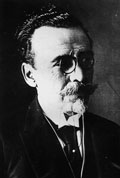After his graduation with a lawyer degree from the Faculty of Law in Recife (1887), Nilo Procópio Peçanha was admitted to the bar in his native city, Campos, Rio de Janeiro. Abolitionist and republican, Peçanha was a founder of the Fluminense Republican Party (Partido Republicano Fluminense, PRF) in 1888, and began his political career with the election to the National Constituent Congress (1890-1891), serving as federal deputy from 1891 to 1903. In 1903, Peçanha was elected federal senator for Rio de Janeiro. He occupied this position until his election as President of the State of Rio de Janeiro (31 Dec 1903 - 1 Nov 1906). Peçanha was successful in his bid for election as Vice President of the Republic (1 Mar 1906) and resigned the office of Rio de Janeiro president before he and president elect, Afonso Augusto Moreira Pena, were sworn in on 15 Nov 1906. Upon the death of Pena (14 Jun 1909), Peçanha assumed the presidency to complete the term. Fifteen months of his government witnessed a struggle for presidential succession. The states of Minas Gerais, Rio Grande do Sul and the military (hermistas) supported the candidacy of Marshal Hermes Rodrigues da Fonseca, while São Paulo and Bahia (civilistas) supported Rui Barbosa de Oliveira. The government actively intervened in the state affairs supporting pro-federal politicians such as president of Amazonas Antônio Bittencourt. The major accomplishments of the Peçanha government were reorganization of the ministry of agriculture and creation of the Agency for Protection of Indians. After the end of his mandate, Peçanha lived for two years in Europe returning to become senator for Rio de Janeiro again (1912-1914). In 1914, after months of standoff and dispute with another candidate, Feliciano Pires de Abreu Sodré, Peçanha for the second time occupied the office of President of the State of Rio de Janeiro (31 Dec 1914 - 7 May 1917). During World War I, he abandoned the presidency of Rio de Janeiro to become minister for external affairs (7 May 1917 - 15 Nov 1918) at the request of President Venceslau Brás Pereira Gomes. As foreign minister, Peçanha was active in declaring war on Germany (26 Oct 1917). He received just a few votes at the election of the vice president of the Republic on 1 Mar 1918 and eventually returned to the Senate (1921). In 1922 Peçanha participated in the extremely tense electoral campaign as a candidate of the Republican Reaction bloc (Reação Republicana), but he lost about 150 thousand votes to Artur da Silva Bernardes. Peçanha attempted to negotiate an alliance with the military, who sought for deposition of Bernardes, but he died (31 Mar 1924) before any of these plans fulfilled. [1] |

